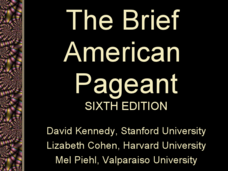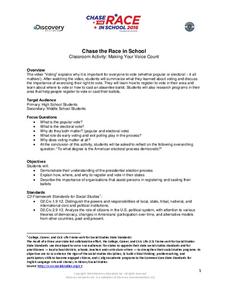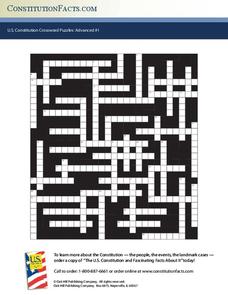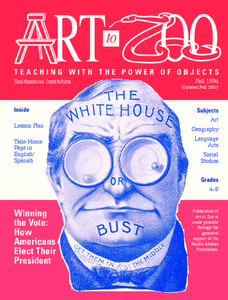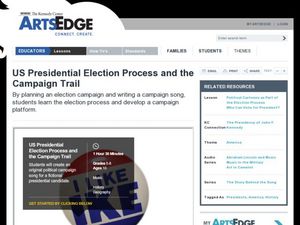Curated OER
Decision Day
Learners participate in a role play activity that emphasizes the theory behind the Electoral College. They form small groups of different sizes in order to present a candidate for class president. Finally, they use a map to determine the...
Curated OER
3 Branches of Our Government
This straightforward fill-in-the-blank activity could be used for a variety of purposes. Young historians are given 10 sentences about the branches of government; they fill in the blanks with terminology that is related to the United...
Curated OER
The Organization of Political Parties
Challenge the future world leaders in your class with this worksheet, which tests their knowledge on the organization of modern political parties. Students can access their prior knowledge of current elections, or notes from your...
Curated OER
Electoral Versus Popular Vote
Students gain an understanding of how the winner of the popular vote might not be the winner of the electoral vote by voting on a snack. They be divided into groups with a representative.
Curated OER
The Old Electoral College Try
Students examine defining issues in the race for the White House and evaluate important issues in several of the swing states. They create and administer a poll in their community and make predictions by analyzing the data.
Curated OER
The Brief American Pageant: The Resurgence of Conservatism
Take a short trip back in time with this presentation, which details the political and electoral contexts of 1980's and 1990's America. Covering the Gulf War as well as domestic economics, these slides feature easy-to-read charts and...
Curated OER
The Brief American Pageant: The Eisenhower Era
Starting with the election results of Eisenhower over Stevenson in 1952, this presentation features additional maps about the elections of 1956 and 1960, with electoral votes by state. Additional slides detail the Far East (Vietnam,...
Curated OER
Let the Campaign Begin
Students differentiate between positive and negative personal attributes and select a fictional character for nomination who personifies the qualities of a good leader. They use the Internet to learn about the election process and write...
Constitutional Rights Foundation
The Lincoln-Douglas Debates — Springboard to the White House
The Lincoln-Douglas Debates saw two primary political candidates debating seven different times about one of the most important social movements in United States history. Middle and high schoolers read an article that describes the...
Discovery Education
Making Your Voice Count
As learners watch a video on voting, they take notes on a worksheet that lists various voting topics, including electoral and popular votes, early voting, and exit polling. Then, young people research the Internet for their state's...
Constitution Facts
U.S. Constitution Crossword Puzzles: Advanced #1
What do Boston Harbor, the Electoral College, and Chief Powhatan have in common? They all represent vital moments in American history—and they are all clues in a thorough and challenging crossword puzzle about the United States...
Curated OER
Presidential Campaigning
Eighth graders participate in a simulated presidential campaign by conducting research on the Internet. They define a party platform, run a campaign and write and deliver speeches in teams. Students can then act as the electoral college...
Curated OER
The White House or Bust: How Americans Elect Their President
Students explain the presidential duties and who is eligible to run for president. In this The White House or Bust article, students complete a map of the electoral college. In addition students analyze historical campaign posters....
Constitutional Rights Foundation
Winner-Take-All: The Two-Party System
Two's company, three's a crowd. High school historians learn about the Electoral College, a two-party, winner-take-all voting system in the United States. The lesson plan explains the pros and cons of the two-party system, roadblocks for...
Heritage Foundation
The Office of the Executive
An executive is not just a leader of a company; you can also use the term to describe the president of the United States. The ninth part of a 20-part unit teaches high schoolers about the importance of the executive branch and the...
Heritage Foundation
The Senate
Do your learners struggle to understand the differences between the Senate and the House of Representatives? Help them develop an understanding of how the US Constitution's clauses affect the Senate's operations. A high-quality...
Heritage Foundation
The House of Representatives
The House of Representatives has a lot of responsibility in the United States government. But how did it all begin, and why is it the way it is now? A comprehensive lesson answers all of these questions about the US Constitution...
Curated OER
Presidential Elections: A Simulation
Feeling ambitious about getting your scholars examining the election process? While this presidential election simulation will take preparation, the ensuing enthusiasm will be worth it! Using one or more large classes, 12th graders are...
Curated OER
US Presidential Election Process and the Campaign Trail
Students campaign for president. In this presidential election instructional activity, students discuss the process of electing presidents, write their own campaign songs, research a campaign train schedule, and create campaign maps.
Curated OER
The 1932 Election: A Turning Point in History
Young scholars discuss the presidential election in 1932. In this U.S. history lesson, students compare and contrast the differences between the Hoover administration and the administration of FDR. Young scholars work in groups and...
Curated OER
Reading the Election Results
Students read a chart that shows results of the 1996 presidential election. They answer teacher created questions about the chart.
Encyclopedia Britannica
Becoming US President
It's that time of year, and the year. Once again the race is on for the White House. It's important that young voters, and would-be voters, understand the process for becoming the United States President. Class members research the...
Curated OER
Presidential Race
Students explain the way in which a candidate wins an electorial race and the number of votes necessary to win in the electoral college through movement.
Curated OER
Reviewing the Election Process by NOW Classroom for PBS
Students take a closer look at presidential elections. In this election process instructional activity, students discuss the roles of the primary, caucus, polls, Electoral College, delegates, and lobbyists in the process. Students then...
Other popular searches
- Electoral College
- Electoral College Map
- Government Electoral College
- 2000 Electoral College
- Electoral College Chart
- Teaching Electoral College
- Electoral College Activities
- The Electoral College
- History, Electoral College
- Electoral College Useful?
- Electoral College Projects
- Electoral College Map 2008







